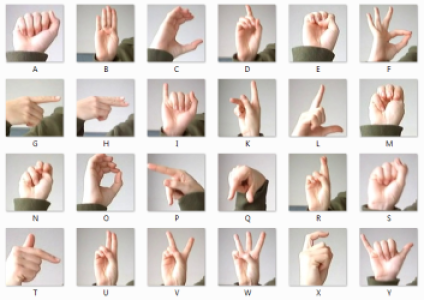ASL Classification 

The American Sign Language Fingerspelling Alphabet
Overview
One of the primary goals for CSCI547 is to give you some experience in applying the algorithms that we learn about in Machine Learning to a variety of problems, perhaps in your particular area of specialization. The final project for this course is designed to give you an opportunity to apply the machine learning skills you've learned to a non-trivial problem of interest.
Project Scope
Your project will entail the application of a machine learning technique to a dataset. You may apply a technique that we learned about in class to a dataset that we haven't seen before, or you may apply an algorithm that you would like to research on your own to one of the datasets we've seen in class, or you may try something entirely new. For obvious reasons, it will not be allowed to apply an algorithm we learned about in class to a dataset we used in class.
Deliverables
Once you've identified the scope of your project, you should write a code base that represents a working machine learning model. This code base should not only deal with training the model, but also include elements of validation and model selection indicating a deep exploration of the chosen method and dataset. In addition to the code, you will need to prepare a paper consisting of a literature review framing the problem that you are trying to solve (you should read and cite at least 2 papers, but probably more), methods, results, discussion, and conclusions. There is no specified length for this paper, but it does need to be long enough to justify the work that you did! As with all scientific writing, well-made figures are a highly welcome inclusion.
Implementation
Convolutional Neural Networks
class Net(nn.Module):
def __init__(self, N, n_input):
super(Net, self).__init__()
self.conv_layer = nn.Sequential(
# Conv Layer block 1
nn.Conv2d(in_channels=1, out_channels=32, kernel_size=3, padding=1),
nn.ReLU(inplace=True),
nn.Conv2d(in_channels=32, out_channels=64, kernel_size=3, padding=1),
nn.ReLU(inplace=True),
nn.MaxPool2d(kernel_size=2, stride=2),
# Conv Layer block 2
nn.Conv2d(in_channels=64, out_channels=128, kernel_size=3, padding=1),
nn.ReLU(inplace=True),
nn.Conv2d(in_channels=128, out_channels=128, kernel_size=3, padding=1),
nn.ReLU(inplace=True),
nn.MaxPool2d(kernel_size=2, stride=2),
# Conv Layer block 3
nn.Conv2d(in_channels=128, out_channels=256, kernel_size=3, padding=1),
nn.ReLU(inplace=True),
nn.Conv2d(in_channels=256, out_channels=256, kernel_size=3, padding=1),
nn.ReLU(inplace=True),
nn.MaxPool2d(kernel_size=2, stride=2),
)
self.fc_layer = nn.Sequential(
nn.Dropout(p=0.1),
nn.Linear(2304, 1024),
nn.ReLU(inplace=True),
nn.Linear(1024, 512),
nn.ReLU(inplace=True),
nn.Dropout(p=0.1),
nn.Linear(512, N)
)
def forward(self, x):
x = self.conv_layer(x)
x = x.view(x.size(0), -1) # Flatten output of conv layer
x = self.fc_layer(x)
return x #logits